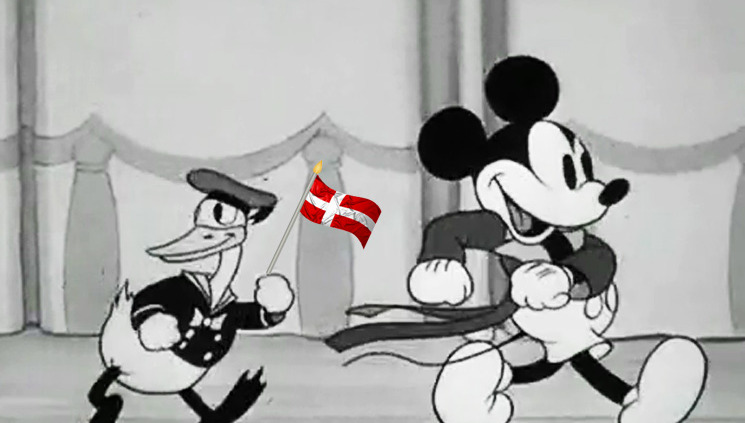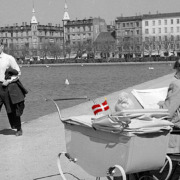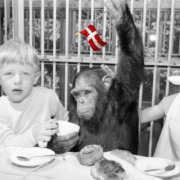Donald Duck, Anti-depressants and the Myth of Danish Happiness
Whenever I hear that Denmark is the happiest country in the world, I think of Donald Duck.
Donald Duck is extremely popular in Denmark, as he is in all Nordic countries. He is much more popular than Mickey Mouse. He even has his own Danish name – Anders And. Which means, basically, Anders the Duck.
I don’t know how much you know about Disney characters, but Donald Duck – or Anders Duck – is kind of a second-class citizen. While Mickey Mouse is the perfect gentleman, outgoing and take charge, the face of Disney, Donald is lazy. He likes to come up with clever ways to avoid work, or avoid any exercise whatsoever. He’s often short-tempered, and jealous of Mickey.
Donald Duck is an underdog, and Danes identify with the underdog. They identify with the idea of low expectations, and then being pleasantly surprised when things turn out well.
This is the secret to Danish happiness. While Americans might identify with bright, happy Mickey, there’s a lot of room for disappointment if your bright, happy plans don’t work out the way you hoped they would.
Dashed expectations
Danes are OK with dashed expectations, of disappointment. Denmark is a small country, often tossed around by big countries. Denmark hasn’t won a war in more than 400 years, during which time they’ve lost a lot of territory. Parts of Sweden, parts of Germany, all of Norway. And Denmark has long been an agricultural country in a tough climate, with crops that sometimes succeed and sometimes fail.
The Denmark we know now is hip, green, and confident. But 100 to 200 years ago, Denmark was one of the poorest countries in Europe.
So, given their history, Danes have turned this repeated disappointment into a form of humor called ‘self-irony’, the ability to make fun of yourself.
Failure beer
For example, there’s an old tradition called the kvajebajer, or a ‘Failure Beer’. When you’ve made a big mistake or a made big fool of yourself, you treat the people who saw you to a pint of beer. I read in an interview with one of Denmark’s great young ballet stars, Alban Leindorf, that he’d fallen down during practice while trying to do a tricky pirouette. That evening, he bought kvajebajer – failure beer – for all the other dancers who had witnessed his fall.
In the honor-based Asian countries, if you make a mistake, you lose face, it’s very embarrassing. You’ll do anything you can to hide it. In Denmark, if you fail you’re expected to not just admit it, but pretend to celebrate it. It shows you don’t take yourself too seriously, that you don’t think you’re better than anyone else. And that’s very, very Danish.
[icon name=”facebook-square” class=”fa-3x”] [icon name=”twitter-square” class=”fa-3x”][icon name=”instagram” class=”fa-3x”]
Buy Kay’s books about Denmark on Amazon, Saxo, Google Books, Apple Books, Barnes & Noble Nook, or via our webshop.
Image mashup copyright Kay Xander Mellish [current_year]
Read also:
No planned hangovers: 13 years after moving to Denmark, here are some ways I won’t fit in








Ahem, we did win the 3 Year War (1848-50). Otherwise, you’re right 🙂
Thanks Kjeld! I stand corrected. :=)
i love your podcasts. I also bought and read the book, your observations are quite hilarious. Keep up the good work!
Thanks, James! I appreciate it. 🙂
“In the honor-based Asian countries, if you make a mistake, you lose face, it’s very embarrassing. You’ll do anything you can to hide it. In Denmark, if you fail you’re expected to not just admit it, but pretend to celebrate it. It shows you don’t take yourself too seriously, that you don’t think you’re better than anyone else. And that’s very, very Danish.”
My question is, why is the assumption that Danes “don’t think you are better than anyone else” still being mentioned? In other words, Danes and Denmark DO think their country is in a better shape (if not the best) than most other countries. That their welfare is better (or the fact that it exists) than other places. That Muslims are somehow less or worse than them in many respects. That non-eu citizens and eu citizens are different, (dont even get me started on the danish courts when children have a danish and foreign parent and there is a divorce)
As a foreigner here who has had contact with a plethora of well educated danes on a daily basis, I dont see this “don’t think you are better than anyone else” attitude from the Danes, but rather the opposite. In fact, i think it’s just masked very well, precisely due to not wanting to appear like assholes.
And this is evidenced by the fact that Danes tend to relativize everything about country. If something is to be criticized in denmark, about denmark or danes or the government’s policies Danes will bo to EXTREME lengths to excuse it, compare it to other countries and or think you must be insane. Example, i think their public healthcare system is mediocre at best. Their educational system, the same….. Yet if you criticize these things, you will feel the wrath. Why, i wonder? Hmmmm….all of a sudden this “no one is better than anyone else” crap just doesnt add up. But besides that, i agree with the rest of the article.
“Yet if you criticize these things, you will feel the wrath. Why, i wonder?”
Um, maybe because it’s generally considered rude for a guest to criticize their host? Or maybe that’s just in Denmark? If I’m invited to someones house, I don’t criticize their decor or the meal I’m served. That would be rude! And people think it’s rude to criticize the country you’re visiting too. After all, it’s our parents and grandparents who’ve built it, and it’s us who’ve voted for the politicians who run it today, so indirectly, you’re cirticizing both us and our families…
That said, I think you’re right about the education and healthcare in some ways – they’re certainly not the best in the world, but at least they’re equal access. I can point to many countries where the rich get better healthcare and education than here, but not very many where the poor do. So if you compare the service that the top 10% of the population get, then yes, Denmark is mediocre, but if you compare the bottom 10% then I think we’re doing pretty well.
I also think you’re right that we are actually very smug and not as humble as we like people to think we are. Again… it’s not that we don’t want to be the best, and hate to fail. It’s just that it’s considered childish and impolite to actually express it. So we try to hide our smugness and we try even harder to hide that it bothers us to fail. But don’t be fooled for a minute – we still know exactly who’s the best/ritchest/most sucessful, and who fails miserably. It’s just not very nice to brag, and it’s childish to be botherd by failing. That doesn’t mean we don’t like to win and hate to lose.